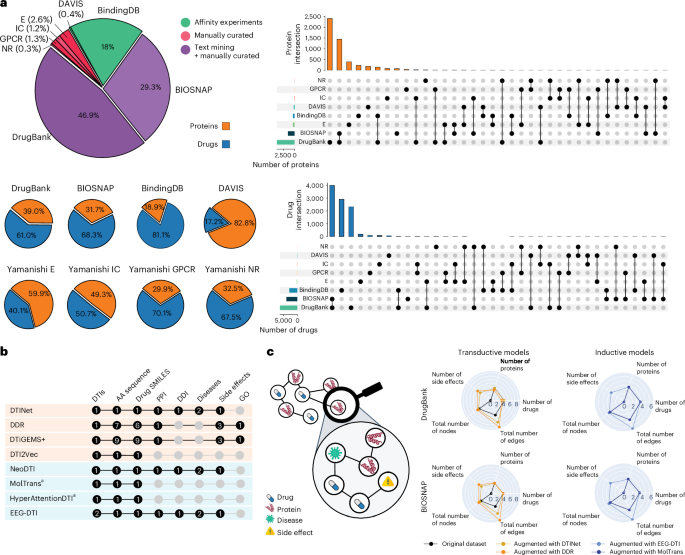Towards a more inductive world for drug repurposing approaches
IF 18.8
1区 计算机科学
Q1 COMPUTER SCIENCE, ARTIFICIAL INTELLIGENCE
引用次数: 0
Abstract
Drug–target interaction (DTI) prediction is a challenging albeit essential task in drug repurposing. Learning on graph models has drawn special attention as they can substantially reduce drug repurposing costs and time commitment. However, many current approaches require high-demand additional information besides DTIs that complicates their evaluation process and usability. Additionally, structural differences in the learning architecture of current models hinder their fair benchmarking. In this work, we first perform an in-depth evaluation of current DTI datasets and prediction models through a robust benchmarking process and show that DTI methods based on transductive models lack generalization and lead to inflated performance when traditionally evaluated, making them unsuitable for drug repurposing. We then propose a biologically driven strategy for negative-edge subsampling and uncovered previously unknown interactions via in vitro validation, missed by traditional subsampling. Finally, we provide a toolbox from all generated resources, crucial for fair benchmarking and robust model design. The authors address the challenge of predicting drug–target interactions, which is crucial for drug repurposing, by introducing a robust benchmarking framework. Using a biologically driven strategy, they uncover previously unknown interactions.


走向一个更加感性的药物再利用世界
药物-靶标相互作用(DTI)预测是药物再利用中一项具有挑战性的重要任务。基于图模型的学习已经引起了特别的关注,因为它们可以大大减少药物再利用的成本和时间承诺。然而,除了dti之外,许多当前的方法还需要高需求的附加信息,这使得它们的评估过程和可用性变得复杂。此外,当前模型学习架构的结构差异阻碍了它们公平的基准测试。在这项工作中,我们首先通过稳健的基准测试过程对当前的DTI数据集和预测模型进行了深入评估,并表明基于转导模型的DTI方法缺乏泛化性,并且在传统评估时导致性能膨胀,使其不适合药物再利用。然后,我们提出了一种生物学驱动的负边子采样策略,并通过体外验证揭示了传统子采样所遗漏的先前未知的相互作用。最后,我们从所有生成的资源中提供了一个工具箱,这对于公平的基准测试和健壮的模型设计至关重要。
本文章由计算机程序翻译,如有差异,请以英文原文为准。
求助全文
约1分钟内获得全文
求助全文
来源期刊

Nature Machine Intelligence
Multiple-
CiteScore
36.90
自引率
2.10%
发文量
127
期刊介绍:
Nature Machine Intelligence is a distinguished publication that presents original research and reviews on various topics in machine learning, robotics, and AI. Our focus extends beyond these fields, exploring their profound impact on other scientific disciplines, as well as societal and industrial aspects. We recognize limitless possibilities wherein machine intelligence can augment human capabilities and knowledge in domains like scientific exploration, healthcare, medical diagnostics, and the creation of safe and sustainable cities, transportation, and agriculture. Simultaneously, we acknowledge the emergence of ethical, social, and legal concerns due to the rapid pace of advancements.
To foster interdisciplinary discussions on these far-reaching implications, Nature Machine Intelligence serves as a platform for dialogue facilitated through Comments, News Features, News & Views articles, and Correspondence. Our goal is to encourage a comprehensive examination of these subjects.
Similar to all Nature-branded journals, Nature Machine Intelligence operates under the guidance of a team of skilled editors. We adhere to a fair and rigorous peer-review process, ensuring high standards of copy-editing and production, swift publication, and editorial independence.
 求助内容:
求助内容: 应助结果提醒方式:
应助结果提醒方式:


